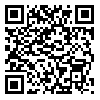Background and aims: Occurrence of crashes and forward collisions, one of the most frequent types of roads and highways incidents, is mostly resulted by drivers’ distraction. Forward collision warning systems (FCWS) are of the technologies which may improve driver’s situational awareness, and consequently driving performance. The present study has aimed to design an intelligent forward collision warning system (IFCWS), and evaluate its effect on driving performance.
Methods: Driving performance variables including initial reaction time (IRT), movement time (MT), brake reaction time (BRT), frequency if errors (ER) and distance between two vehicles (D), were measured through four various tests (without and with a cognitive secondary in-vehicle task, off/on warning system).
Results: The results indicate a significant effect of the secondary task on drivers’ reaction time, frequency of errors, and distance between the two vehicles. Moreover, the IFCW system led to a decreased frequency of errors and reaction time. However, the warning system had no significant effect on drivers’ movement time.
Conclusion: The IFCW system improved driving performance. Further naturalistic studies, with more participants are required to validate the results of the study.
Received: 2015/03/18 | Accepted: 2015/11/3 | Published: 2016/05/10
| Rights and permissions | |
 |
This work is licensed under a Creative Commons Attribution-NonCommercial 4.0 International License. |


